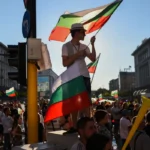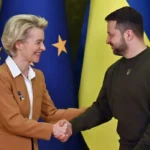Almost a month late, the European Commission announced on Wednesday (January 17) that it would “now begin” the procedure for examining the accession of Ukraine and Moldova.
“The president [of the Commission Ursula von der Leyen] said that the review would begin. […] We are now starting to work on the review process,” Eric Mamer, chief spokesperson for the European Commission, told reporters in Brussels.
The long process of analytical examination (screening, in English) makes it possible to determine the degree of alignment of the legislation of the candidate countries with that of the Union, namely with the “acquis”, and to define the necessary adaptations.
“The first step consists of setting up multidisciplinary teams covering the entire acquis […] which is divided into 33 chapters,” explained Ana Pisonero, spokesperson for the European Commission for enlargement issues.
According to Ukrainian officials, a delegation will arrive in Brussels “no later than a week”.
Speaking at the European Parliament earlier today, Ursula von der Leyen once again welcomed the EU’s decision to open the door to Ukraine and praised Kiev’s efforts to reform its democratic institutions.
“In preparation for the accession negotiations, we are starting the review process and putting in place the negotiation framework,” Ms von der Leyen also indicated.
She recalled that European leaders had demonstrated in December “the political will to support Ukraine for as long as necessary”. She also stressed that the EU “must support this decision with adequate funding”.
On Tuesday (January 16), Ukrainian President Volodymyr Zelensky met with Ms von der Leyen on the sidelines of the World Economic Forum (WEF) in Davos, where they agreed to launch the process. This meeting would have taken place following a “direct request” from the Ukrainian side.
A surprising delay
Before Wednesday’s announcement, the majority of EU member states had been “surprised” by the Commission’s delay, several EU diplomats told Euractiv.
“We expected it to start very quickly, especially in light of a very uncertain and volatile 2024,” one of them said.
In November, European Commission officials explained that technical preparatory work on a negotiating framework could begin immediately after EU leaders make a political decision to do so, which was the case at the summit in December.
They also said the EU executive would be ready to send its negotiating teams to kyiv and Chișinău, capital of Moldova, “the day after” the announcement. However, before Wednesday’s communication, the review had not yet started.
According to our information, a meeting initially planned with Ukrainian Deputy Prime Minister Olha Stefanichyna, scheduled for the week following the December decision, had to be canceled due to the lack of responsiveness of the EU executive.
At a lunch with Ms von der Leyen last week, ten member states expressed, through their ambassadors, their concern about the delay, according to five EU diplomats.
“We encouraged the European Commission to immediately launch the process, which has not yet started and which should have already started,” one of them said.
The Commission’s Directorate-General for Neighborhood and Enlargement Negotiations (DG NEAR) was “ready to start immediately, and Ukraine was also ready, but nothing happened. For what ? We must ask the commissioner [for Enlargement, the Hungarian Olivér Várhelyi],” declared this same diplomat.
Asked by Euractiv about the late announcement of the launch of the examination procedure, a spokesperson for the European Commission affirmed that “the Commission services were in permanent contact with the [Ukrainian and Moldovan] authorities” and that this had been the case “immediately after [the European summit] in December”.
“The Commission has started to prepare the draft [negotiating framework] which will be submitted to the Council in the coming weeks,” he continued.
“As we have already mentioned, the review process will continue immediately. This is the presentation phase of the review which can begin now,” he concluded.
Next steps
Generally, the process of reviewing the Community acquis takes between one and two years. However, EU officials estimate it could take between six and nine years in Ukraine’s case.
According to EU diplomats, many hoped the review would be completed before Hungary’s presidency of the EU Council, which begins in July, to avoid the issue becoming too politicized.
EU policymakers had hoped that the first intergovernmental conference (IGC) — at least for Ukraine — could have been held soon after March 2024.
According to EU officials and diplomats, the review process can be carried out in parallel with the first IGC, as it does not need to be completed to convene such a meeting.
An EU-Ukraine association council, initially scheduled for January 29, has been postponed, a source close to the Ukrainian government told Euractiv.
This article is originally published on euractiv.fr






